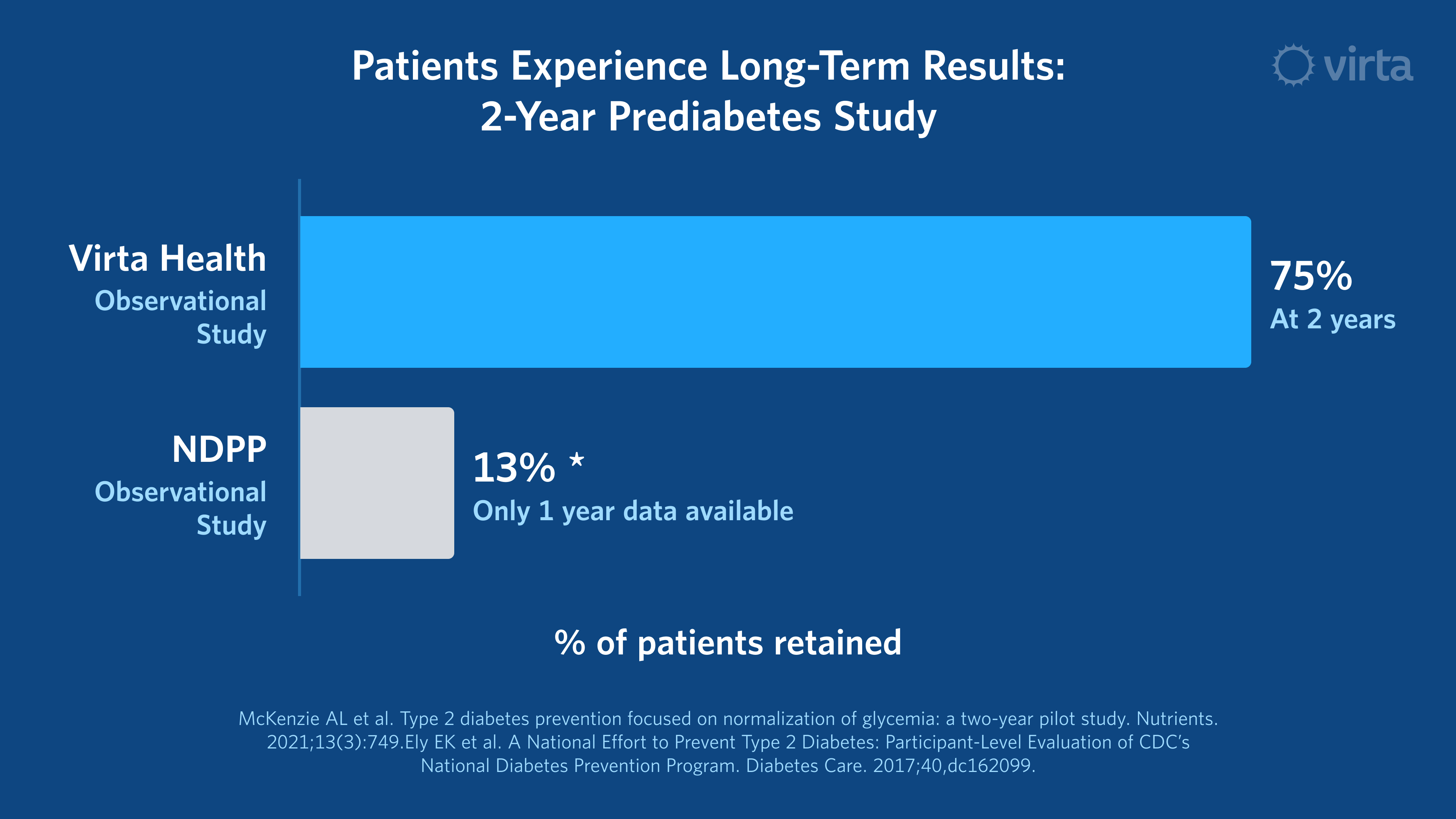
Using Virta’s Reversal Program To Help The 88 Million Americans With Prediabetes

Our mission is to reverse type 2 diabetes in 100M people by 2025. But what if we could just prevent the millions of people with prediabetes—88M in the United States—from progressing to type 2 diabetes in the first place?
New Virta research from our landmark clinical trial on diabetes reversal offers clarity to this question. Today, we announced the publication of new peer-reviewed research examining our reversal program's effect on helping those living with prediabetes. The results, to say the least, are highly encouraging. Here’s what we learned.
Virta’s reversal program works for prediabetes, too
The prevailing narrative is that type 2 diabetes is “chronic and progressive.” Virta patient outcomes continue to challenge this notion.
Over 2 years, 97% of Virta prediabetes patients avoided progression to type 2 diabetes. Using the National Institutes of Health Diabetes Prevention Program (NIH DPP) trial as context¹, one way to frame this is that nearly 3x more people progress to T2D in the NIH DPP lifestyle intervention (approximately 5x more in the Metformin intervention), compared to Virta patients.
.jpeg)
Virta’s approach goes beyond progression avoidance. In fact, 52% of Virta patients achieved prediabetes reversal during our two-year evaluation period. And, patients lost an average of 11.3% of body weight, exceeding the goal of the National Diabetes Prevention Program (NDPP) by more than 2x.
%2520-%2520Blog%2520Image%2520(1).jpeg)
Nutritional interventions are in fact, sustainable. It just takes the right care model.
We commonly hear that nutritional interventions don’t work because they aren’t sustainable. Again, our patient outcomes suggest otherwise.
Retention in the study was 80% at one year, and 75% at two years, far exceeding the 32% at 10 months and 13.2% at one year published in two different analyses of the NDPP.

How is this possible? It starts with the right intervention. But for long-term retention, the care model makes all the difference. Virta’s continuous remote care platform—where patients often interact with our clinical team multiple times per day—helps make long-term success a reality.
Even better news? This retention represents the floor of what is possible. As more and more patients are treated, we use data to optimize and improve treatment for future patients.
Treat the root cause, and many other conditions improve, too
People with type 2 diabetes often have multiple co-morbidities. This can result in a complex medication regimen with a specific drug for each condition. What often follows is a never-ending game of symptom “whack-a-mole” and typically an increased medication load.
Once again, we’re showing this doesn’t have to be the case. Virta attacks the root cause of disease, thereby creating a host of “side-benefits” beyond blood sugar improvement. This of course includes weight loss—life-changing in many instances. It also includes significantly improved cholesterol, markers of liver disease, and several other factors that contribute to cardiovascular disease. Additionally, Metabolic Syndrome was resolved in just under half of our prediabetes patients at two years.
We are excited and humbled by these results. They would be impossible without the dedication of our research, product, and clinical teams responsible for supporting our patients on their journey of health transformation. And of course, the ultimate gratitude goes to our wonderful patients, who continue to inspire us on our mission to make the diabetes epidemic a thing of the past.
Footnotes
- Given the different trial designs across studies (Virta’s is observational designed to more closely mimic a real-world scenario, the NIH DPP is a randomized control trial) and people volunteered for the study under different conditions, it is difficult to directly compare outcomes. Yet, the NIH DPP RCT is a landmark trial that provides important context. In that trial, approximately 8% of people in the lifestyle intervention, 15% of those treated with metformin, and 22% in the control group progressed to T2D over two years. Only 3% did so in Virta’s study. This is an exciting outcome that also suggests opportunities for future research.
This blog is intended for informational purposes only and is not meant to be a substitute for professional medical advice, diagnosis, or treatment. Always seek the advice of your physician or other qualified health provider with any questions you may have regarding a medical condition or any advice relating to your health. View full disclaimer
Are you living with type 2 diabetes, prediabetes, or unwanted weight?






.jpg)

